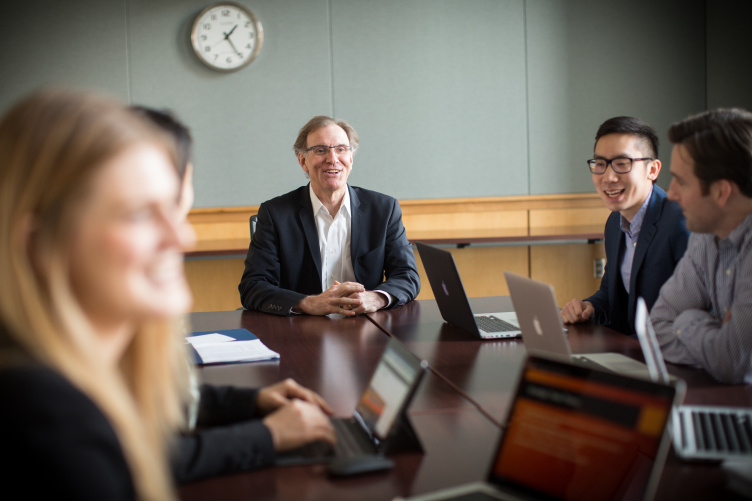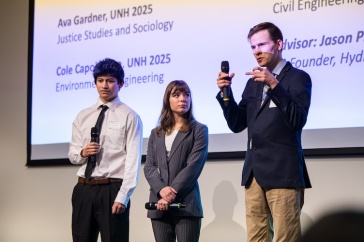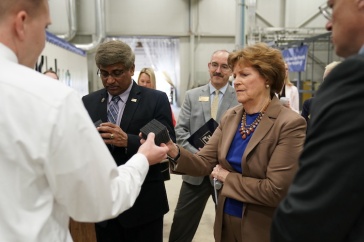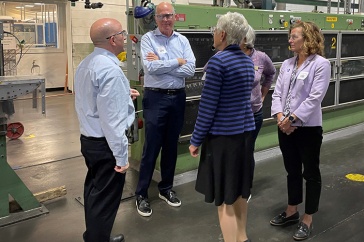
Professor of Marketing Tom Gruen chats with MBA students in a marketing class.
As he prepared to return to his former life as professor of strategic management and technology at Paul College, Peter Lane looked back at his tenure as associate dean of faculty and graduate programs knowing he had made a difference. In particular, he led the faculty in an overhaul of the MBA program.
Due to market changes, the well-known Executive MBA was closed and those resources were reinvested in the other MBA programs. The full-time, online and part-time MBA programs have been updated, strengthened and, most important of all, said Lane, “We’ve turned them into something our faculty and alumni collaborators are excited about!”
Students should be excited, too.
Today’s graduate students want maximum flexibility to design their programs and access specializations, letting them go deep on areas that interest them.
“People get an MBA because they want a better job,” Lane said. “Everything about your program—even the names of your classes—must offer this promise of preparation.”
This fall, the college is rolling out a new slate of specializations including global business, digital marketing, analytics, growth and innovation, and hospitality management.
“Paul College is now one of a handful of universities in the country offering specialization in hospitality management,” Lane says.
In fall 2018, the redesigned core curriculum will launch. It preserves fundamentals such as finance, marketing and management, but shifts course content and titles to reflect modern skillset needs. In this way, Information Systems becomes Creating Competitive Advantage with IT, which will include cutting-edge
topics like big data, Internet of Things and artificial intelligence. Marketing becomes Understanding Customers and Markets and includes greater emphasis on digital marketing, analytics and managing the customer “asset.”
According to the GMAC Application Trends Survey Report, MBA applications in the U.S. declined by 50 percent between 2015–2016. During this same period, the college’s innovative delivery model has enabled MBA enrollment growth of 25% and positioned the college well for the future.
“I’m very proud of how our faculty and staff have been willing to embrace change. It speaks to their commitment to keep improving and growing,” Lane said.
Getting students FIRE(d) up
  |
|
Peter Paul poses with a student at the FIRE carnival. |
Sometimes the reason college students drop out after their first year is not due to finances. They feel isolated or may be struggling with balancing academics and social life.
Three years ago Paul College started tackling this problem head on. It launched a unique program called the First-Year Innovation and Research Experience, or FIRE, to help all first-year students successfully transition to college life.
FIRE is an integrated, team-based and game-like experience to engage students in developing skills and strategies for success as they learn about Paul College, UNH, and all they offer. It was developed by Neil Niman, associate dean of academic programs, who is an expert in game design and learning, and author of the book, The Gamification of Higher Education: Using Game Design to Avert the Growing Crisis Facing Universities Today.
FIRE encourages socialization by awarding points to teams when members take part in a campus activity—such as sports, lectures, or cultural events—or any of UNH’s hundreds of student groups. At year’s end, members of the winning team receive an academic achievement prize.
At the same time, engaged by alumni and peer mentors, students work in teams to develop a business plan to present at the Undergraduate Research Conference. Dubbed “The Grand Challenge,” each team creates a product or service for tackling such daunting topics as “Addictive Society,” “Water is Life,” “Threats from Cyberspace” and “Medical Breakthroughs.”
“By the time they present in the spring, they no longer look and talk like first-year students,” said Sean Stewart, undergraduate program coordinator for FIRE.
FIRE is showing a positive impact on student success. Average GPA for first-year students has increased from 2.99 to 3.16. In 2014, around 8 percent of first-year students earned a 3.75 average; by 2017 that percent rose to 20 percent.
Students also feel more engaged. In the 2016–2017 academic year, 100 percent participated in a campus activity they said they would not have taken part in otherwise, and more than 50 percent took part in at least five activities. Overall, 75 percent of students said they felt greater confidence about the prospect of life after college than when they arrived on campus.
-
Written By:
Dave Moore | Freelance Writer
















































